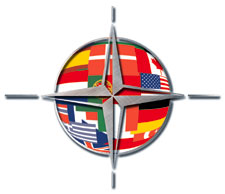Sixty Years after D-Day, We're Pulling Out
 Earlier this week, seven new countries joined NATO.
Earlier this week, seven new countries joined NATO.
All were former Communist Bloc countries or regions of former Warsaw Pact countries that split and established their own sovereignty.
Looking back a couple of decades, I would have never imagined that we would be where we are today. There has been a profound and historic shift in the global strategic environment highlighted by the emergence onto the world stage of newly-formed democracies.
Coming 60 years after the historic invasion of Normandy on June 6, 1944, the eastward expansion of NATO, coupled with the U.S. military's worldwide missions as the only global superpower, are already having broad impacts everywhere.
The changes, and those yet to come, will affect numerous countries of the world and in some cases forever redefine and even fracture longstanding relationships and traditions. This will be defined by two overall factors: (1) where our soldiers need to be and (2) what they will have to do.
The world, and all military leaders and planners, must understand that the days of hundreds of thousands of American soldiers assigned and training in the European heavy warfare scenario, are over. Some still drag their feet on acceptance of this fact.
But the light is on at the Pentagon. Apparently our senior military leaders, civilian and uniformed, have finally embraced this reality. Profound cutbacks in our longstanding European presence are in the offing.
After the fall of the Iron Curtain and the capitulation of communism as an oppressive reality of life in a large part of Europe, American forces were grappling for a mission. Of course, they found it in the Balkans and most specifically the former Yugoslavia.
Our heavy forces, and all our military bases in Germany, morphed into forward operational bases for Balkan peacekeeping operations. (With all the good intent in the world, our troops and their efforts in the former Yugoslavia have not even come close to solving the historically entrenched demographic turbulence there).
We did, however, ensure Western European stability so that the implementation of the Euro currency would be successful and the European Union would enjoy economic parity with the United States.
Now, after 60 years of occupying Europe, Pentagon planners have developed a strategy to withdraw approximately half of the 71,000 troops currently based in Germany. Currently, there are just about 102,000 U.S. military service personnel in Western Europe, to include England, Belgium, Italy, and The Netherlands.
The plan was developed by Douglas J. Feith, The Pentagon's undersecretary for policy. Feith bluntly noted that potential threats have changed since the Cold War ended as the Eastern Bloc unraveled in 1989, some fourteen years ago. I am glad he noticed this fact.
Basically, the plan calls for the elimination of a number of large Cold War-construct overseas bases. The overall concept is not yet finalized and it has not been blessed by our nation’s very top leaders yet, but it is coming.
U.S. forces will be repositioned around the globe, in smaller and more austere bases, located closer to what are considered potential trouble spots. Our soldiers will also have a greater reliance on the pre-positioning of combat equipment at staging areas in strategically significant locations and on prepositioned ships.
Other countries that wish to cooperate with and support U.S. prepositioning will be designated as “cooperative security locations.” There no doubt will be quid-pro-quo agreements between the United States and the cooperating countries.
Again, when one considers the threat, and threat-based mission analysis being a significant part of real-time and future military planning, this is illustrative of forward thinking and wise insight being applied in defense of our country. Better late than never.
Also included is a facet of the plan to reduce 60 percent of the 56,000 soldiers in Germany that are assigned to the Army’s 1st Infantry Division and the 1st Armored Division.
My own prediction is that combat soldiers who remain in Germany will consist of a portion of the Army’s new Stryker brigade units. Military sources, some former subordinates of mine who must remain unidentified, tell me that a brigade-sized force, with its lightly-armored wheeled vehicles and rapid deployment ability, will be on stand-by in Germany. Soldiers will be sent to Germany on shorter “non-accompanied” tours, leaving their family members at home at Army bases stateside.
As the plan further unfolds we will see that a number of overlapping high-level commands in Europe will be eliminated through the consolidation of various headquarters commands.
On Campbell Kaserne, in Heidelberg, one finds, only a few hundred feet from each other, both U.S. Army Europe (USAREUR) headquarters and V Corps headquarters. This obsolete Cold War hierarchy should be the first to go, and the optimum solution would be to drop the axe on USAREUR and allow V Corps to assume overall command of the smaller force.
In Stuttgart, less than two hours down the road from Heidelberg, one finds yet another giant headquarters, the United States European Command (EUCOM). Deactivating this massive organization will not go without significant kicking and screaming from both local German politicians and tradition-bound Army generals.
Diplomatic issues are also a consideration with the withdrawal and realignment of American soldiers now based in Europe. Business agreements, jobs, and friendships are long-standing. Germany will experience a major economic hit from further U.S. military reductions.
There are some who believe that our cutbacks, particularly in Germany, are a result of U.S. resentment of the current socialist German government’s failure to support Operation Iraqi Freedom, but this is a shortsighted and uninformed view.
For one thing, while the number of soldiers will decline, there is a question as to whether the overall U.S. presence will actually diminish. The answer seems logical, but don't bet on it.
Numerous jobs – in fact, thousands of jobs in Europe and most particularly in Germany, have already been outsourced to civilians. Hundreds of jobs are open, now in Europe, for all areas of military expertise. The level of a possible candidate’s security clearance, the higher the worth associated with recruiting that particular candidate.
I know of government contractors who are literally “screaming” for employees, particularly those with security clearances at the Top Secret level with higher access caveats. Jobs are available all over Europe and throughout the Balkans. Moreover, a rapidly expanding number of contractors are recruiting for help in Iraq, which is just as dangerous for contracted employees as it is for anyone else.
The bottom line is that the reach-back capability has been changed. In the past, Army green-suiters used to be deployed from their home stations into harm’s way with a reach-back capability to other soldiers in their units. The support ranged from beans and bullets, to replacements, to intelligence.
In the future, civilian contracted employees will provide that reach-back capability for military units, deploying from anywhere in the world. Scores of defense contracting companies have ingratiated themselves all over Europe and particularly in Germany and will largely replace or replicate the actions of many soldiers who will leave Germany under Feith’s plan.
With the entry of Bulgaria, Estonia, Lithuania, Latvia, Romania, Slovakia and Slovenia into NATO, the future focus of the alliance is clear: A lighter, mobile multi-national force deploying from either the United States or a smaller number of European bases, utilizing new austere facilities located well east of the long-departed Iron Curtain.
The Cold War is over. We kept Europe safe for 60 years.
It’s time to move on.
By J. David Galland
J. David Galland is Deputy Editor of DefenseWatch. He can be reached at defensewatch02@yahoo.com.
Subscribe to Pravda.Ru Telegram channel, Facebook, RSS!




